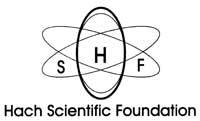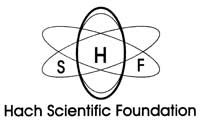 at URI
at URIin response to national chemistry teacher shortage
KINGSTON, R.I. — July 31, 2006 — University of Rhode Island students with a passion for chemistry and teaching could get help paying for their education. That’s because the Hach Scientific Foundation, which is based in Colorado and dedicated to promoting chemistry education, plans to extend its outreach support to address the national deficit of content-qualified chemistry teachers.
Starting in the 2007-2008 academic year, the foundation will provide two $6,000 undergraduate scholarships to future high school chemistry teachers studying at URI. The scholarships, earmarked for students with financial need and academic aptitude, are renewable each year providing the student maintains at least a 3.0 and signs a yearly intent to become a chemistry teacher.
“Our scholarships work all the way through six years of school since many students do not decide they have a talent and a passion for teaching until they have a chance to tutor or assist in the classroom. If a senior, for example, decides to become a teacher and would like to get their education coursework after graduation, we would be happy to provide scholarship funding,” said Bryce Hach, the foundation’s director of scholarships and university relations.
Hach said the foundation, which has a history of giving scholarships locally, is launching a national effort to increase the number of chemistry teachers by giving two scholarships to every land grant university. (URI is a land grant, sea grant, and urban grant University.)
“Every time I meet a scholarship recipient, I always ask the same question: “Why do you major in chemistry? Ninety percent of the students respond: their high school chemistry teacher influenced them. Teachers have a profound influence.”
Yet only 27 percent of high school chemistry teachers have a degree in chemistry, according to Hach. In Rhode Island, like most states, there is a shortage of chemistry teachers (as well as mathematics, physics, and special education teachers.) To help alleviate the shortage, the Rhode Island Department of Education will issue an emergency permit at the request of a district when it has been unsuccessful in securing a credentialed teacher to fill that position. The permit is generally issued to a teacher already certified in an allied area, such as general science or physics.
There is general agreement that the lack of chemistry teachers is due to the lure of generous compensation packages given to well-qualified individuals by the private sector.
“It’s a wonderful program that will help address the shortage of chemistry teachers in Rhode Island,” said Bill Euler, chair of URI’s Chemistry Department. “The scholarships will be extremely beneficial to our students.”
During this academic year, there are about 175 students majoring in chemistry at URI and another 3,100 non-majors taking chemistry classes. “Forty percent of our degree programs require one or more chemistry courses,” says Bill Euler, chair of URI’s Chemistry Department, noting that chemistry is a cornerstone for majors such as pharmacy, oceanography, engineering, nursing, kinesiology, and textiles.
URI offers courses in analytical, inorganic, organic, physical chemistry and biochemistry. Faculty and students can enjoy the unique opportunity of participating in two multidisciplinary research partnerships, which often reach beyond the borders of the campus. The Sensors and Surface Technology Partnership focuses on microsensors, nanofabrication and microstructural engineering, coatings for corrosion resistance, and integrated circuits. The Forensic Science Partnership, dedicated to enhancing education and research in forensic science, includes faculty, staff from the Rhode Island State Crime Laboratory and interested commercial and governmental agencies.
URI’s Chemistry Department has reached out to the high school community by offering an annual “Chemistry Day” contest to high school students. First offered in 1921, the contest today draws nearly 500 students from 20 high schools across the state who compete in the group and individual competitions.
Clifford and Kitty Hach, Bryce Hach’s grandparents, founded the Hach Co. in 1947. While Kitty developed a business model, Clifford invented and reengineered analysis systems. The analysis, instrumentation, and water chemistries business gained national acceptance and recognition.
The foundation originated within the company in 1982. Since chemical sciences were the bedrock of the company, the Hachs worried that undergraduate chemistry was both underappreciated and underserved. Their foundation began providing six scholarships to undergraduate chemists in Colorado, Iowa, and Wyoming. Their grandson has taken his grandparents’ concern and generosity and spread it across the country.

